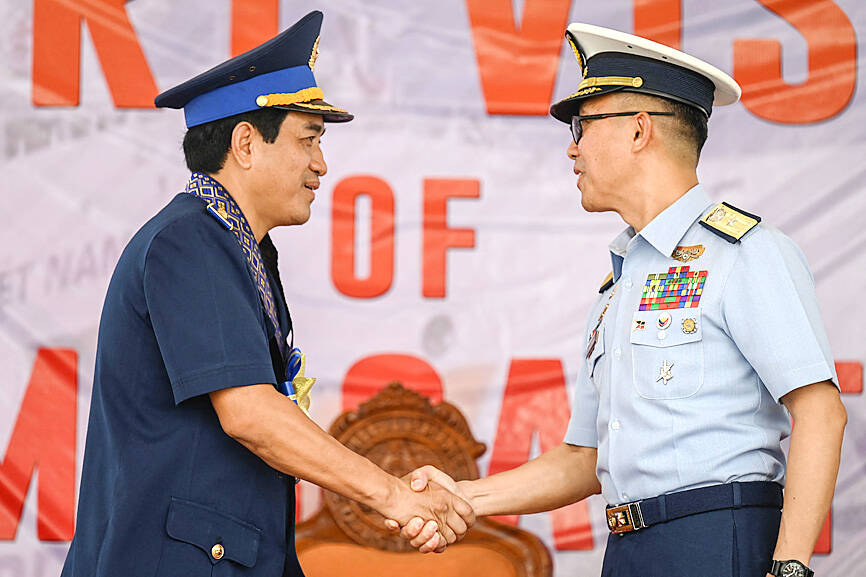A Vietnam Coast Guard ship arrived in Manila yesterday for a four-day goodwill visit and joint exercises as the two nations attempt to put aside their own territorial disputes in the face of rising tensions with China over control of key features in the South China Sea.
The Philippines and Vietnam are among the most vocal critics of China’s increasingly hostile actions in the disputed waters, a key global trade and security route.
The neighboring Southeast Asian nations themselves have overlapping claims in the busy sea passage, along with Taiwan, Malaysia and Brunei, and the disputes are regarded as an Asian flashpoint and a delicate fault line in the US-China regional rivalry.

Photo: AFP
As the host’s coast guard personnel waved Philippine and Vietnamese flags, and a brass band played under the morning sun at Manila’s harbor, a Vietnam Coast Guard ship with 80 crew docked. Some of its officers saluted from the lower and upper decks of the 90m white ship.
While in Manila, the two coast guards are expected to hold talks and tour each other’s ships. They are to hold joint search-and-rescue drills along with fire and explosion contingency drills in Manila Bay, on the western coast of northern Philippines facing the South China Sea.
“This is a good template, a good way to de-escalate the situation,” Philippine Coast Guard spokesperson Rear Admiral Armand Balilo said. “This shows that even rival claimants can have an opportunity to nurture a relationship.”
Colonel Hoang Quoc Dat, who headed the Vietnam Coast Guard’s delegation, said in a speech that the Manila port call was a way to strengthen the two nations’ “cooperative relationship for mutual benefit.”
“This will promote and enhance the efficiency of information sharing and the coordination in maritime law enforcement, in accordance with international law,” he said, adding that such friendly collaboration contributes to “the preservation and protection of the region’s maritime security and safety.”
In a separate goodwill engagement last month, Vietnamese and Philippine navy forces played volleyball, soccer and tug-of-war in the Vietnam-occupied Southwest Cay (Nanzih Reef, 南子礁) in the South China Sea’s hotly contested Spratly Islands (Nansha Islands, 南沙群島), according to Vietnamese and Philippine officials.
Vietnam in June said that it was ready to hold talks with the Philippines to settle their overlapping claims to the undersea continental shelf in the South China Sea, while China has long claimed much of the entire seaway and vowed to defend its territorial interests at all costs.
After a violent June 17 confrontation in the Philippine-occupied Second Thomas Shoal (Renai Shoal, 仁愛暗沙) between Chinese forces — armed with knives, an axe and improvised spears — and Philippine Navy personnel, China and the Philippines reached a temporary agreement last month to prevent further clashes that could spark a major armed conflict in the South China Sea.
A week after the deal was forged, Philippine government personnel transported food and other supplies to Manila’s territorial ship outpost at the shoal, which has been closely guarded by Chinese coast guard and navy ships, and no confrontations were reported.
However, the Philippines has vowed to press on with efforts to strengthen its territorial forces and defense, and expand security alliances with Asian and Western nations.

A Chinese aircraft carrier group entered Japan’s economic waters over the weekend, before exiting to conduct drills involving fighter jets, the Japanese Ministry of Defense said yesterday. The Liaoning aircraft carrier, two missile destroyers and one fast combat supply ship sailed about 300km southwest of Japan’s easternmost island of Minamitori on Saturday, a ministry statement said. It was the first time a Chinese aircraft carrier had entered that part of Japan’s exclusive economic zone (EEZ), a ministry spokesman said. “We think the Chinese military is trying to improve its operational capability and ability to conduct operations in distant areas,” the spokesman said. China’s growing

Nine retired generals from Taiwan, Japan and the US have been invited to participate in a tabletop exercise hosted by the Taipei School of Economics and Political Science Foundation tomorrow and Wednesday that simulates a potential Chinese invasion of Taiwan in 2030, the foundation said yesterday. The five retired Taiwanese generals would include retired admiral Lee Hsi-min (李喜明), joined by retired US Navy admiral Michael Mullen and former chief of staff of the Japan Self-Defense Forces general Shigeru Iwasaki, it said. The simulation aims to offer strategic insights into regional security and peace in the Taiwan Strait, it added. Foundation chair Huang Huang-hsiung

PUBLIC WARNING: The two students had been tricked into going to Hong Kong for a ‘high-paying’ job, which sent them to a scam center in Cambodia Police warned the public not to trust job advertisements touting high pay abroad following the return of two college students over the weekend who had been trafficked and forced to work at a cyberscam center in Cambodia. The two victims, surnamed Lee (李), 18, and Lin (林), 19, were interviewed by police after landing in Taiwan on Saturday. Taichung’s Chingshui Police Precinct said in a statement yesterday that the two students are good friends, and Lin had suspended her studies after seeing the ad promising good pay to work in Hong Kong. Lee’s grandfather on Thursday reported to police that Lee had sent

BUILDUP: US General Dan Caine said Chinese military maneuvers are not routine exercises, but instead are ‘rehearsals for a forced unification’ with Taiwan China poses an increasingly aggressive threat to the US and deterring Beijing is the Pentagon’s top regional priority amid its rapid military buildup and invasion drills near Taiwan, US Secretary of Defense Pete Hegseth said on Tuesday. “Our pacing threat is communist China,” Hegseth told the US House of Representatives Appropriations Subcommittee on Defense during an oversight hearing with US General Dan Caine, chairman of the Joint Chiefs of Staff. “Beijing is preparing for war in the Indo-Pacific as part of its broader strategy to dominate that region and then the world,” Hegseth said, adding that if it succeeds, it could derail